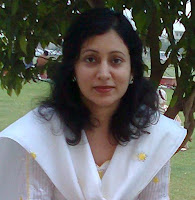Book Title: Adhay Adhooray Khawab
Author: Dr. Shahid Siddiqi
Publisher: Jahangir Books
Pages: 176
Reflections by Amna Khalid
“Adhay Adhooray Khawab” by Dr. Shahid Siddiqi tells the story of a Professor who is a role model for his students. He makes them realize about the great values of life. His main interests are education; sociology and politics. According to him, the love with your dreams and ideology is the best kind of love. In his view, education is a powerful tool to bring change in society. He talks about critical thinking and social change. When his students start their agitation against the injustice in their country, the authorities try to suppress them. At this moment, professor Rai plays the role to protect his students but he becomes the victim of torture.
 |
| Amna Khalid |
As the author himself is an educationist, he has expressed his thoughts, ideas, feelings and dreams through the role of Professor Rai. He has presented his thoughtful insight in the form of a story. Professor Rai is not a traditional teacher who is rigid and authoritative. He has his own way of teaching. He knows the art how to motivate his pupils by reaching their minds and hearts. According to him a good teacher should listen to his students, give importance and respect to them, and he should be kind towards his students. In addition to knowledge, teaching methodology and teacher’s attitude, creativity of a teacher is another important factor.
This novel not only gives us the information about new ideas of education but also tells us something beyond that. Some societies want their people to become literate only because they can read and understand the instructions given to them by their authorities. In this way, they teach them the lesson of slavery. The author gives emphasis on the importance of critical literacy as it can be used to bring change in society. The author links the education with ideology. Education should not be neutral and passive rather it should play an active role in society. It can be helpful to minimize the social and financial gap in society. The author has skillfully highlighted that one of the main problems in our society is of social injustice. To eradicate this problem we should make connections between schools and other social institutions through informal education. We cannot claim our success unless we make a connection between education and society. He shows how a teacher can raise awareness in his students.
The intended audiences of this book are teachers, students. This book is appropriate for its audiences. The purpose of writing this book is to give the awareness how education can play an important role in the betterment of a society. The author is successful in achieving his goals. The scope of his work is high. He has supported his arguments by giving the example from real life situation of our country. The book is developed orderly and clearly. The author’s writing style is narrative and language is simple and easy. The prose is highly readable and appropriate to its intended audience.
There are two main characters in this novel Professor Saharan Rai and Imtashal Agha that have the relationship of student and teacher. They have common dreams of social equality, justice and freedom. In the end Professor lost his life during the struggle of the realization of his dreams but his mission does not end here. His student is now going ahead to accomplish it. The novel is written mainly in the settings of educational institutions and hostels. As far as the title “Adhay Adhoray Kawab”is concerned, the author has justified it.
The author has covered the subject adequately. He has thrown light on the realities of life which demand critical thinking. There is a novelty and originality in his work. He presents the features of life which are no more the part of our lives these days. Here students are active and curious to gain knowledge, and teachers are intellectual and inspiring. Everyone has some dreams and is full of zeal and zest. The book has some illustrations, e.g., Emile Bronte’s Wuhthering Heights, Gramsci, Foucault’s idea of Knowledge and Power, Symbolic Violence of French Sociologist Bourdieu, etc. In would suggest teachers to read this book and recommend it to their students.

Congrats, Dr Sahib!
ReplyDeleteI read this today:
ReplyDeleteThe life that I have
Is all that I have
And the life that I have
Is yours
This book came up in my mind while reading.
theterroland: Thanks
ReplyDeleteShirazi sahib, well said.
ReplyDelete